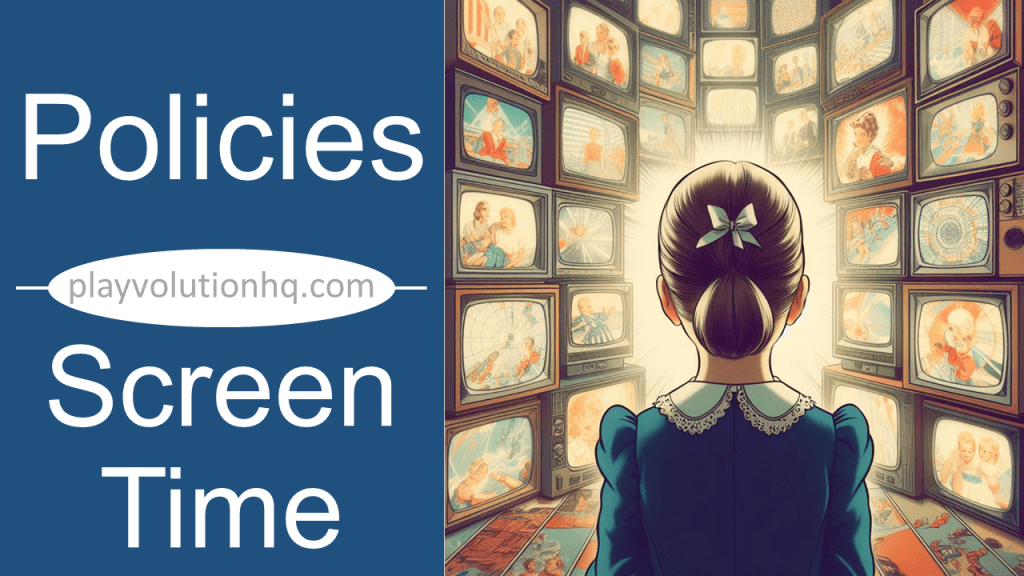
Table of Contents
For better or worse, screen time is becoming a bigger and bigger part of children’s lives. Because of this, child care centers, preschools, and family child care programs must address the ubiquity of screen-based technology and determine how they’ll integrate it into their setting via a thoughtful screen time policy that supports the holistic development of young minds.
Purpose
A well-crafted screen time policy is a roadmap for caregivers, outlining the boundaries and expectations surrounding screen-based technology use in early childhood settings. This policy should:
- Promote Healthy Development—Make developmentally appropriate use of screen time in a program focused on fostering the physical, social, and cognitive development of young children.
- Set Clear Expectations—Establish guidelines that help parents, educators, and children understand the role of screens in the early learning environment.
- Facilitate Conscientious Technology Use—Encourage calculated use of technology to support learning while minimizing negative impacts on children’s well-being.
Where To Include
At Playvolution HQ, we recommend using the Three Handbook Method and adding this policy to your Operating Handbook.
Considerations
Here are 8 things to consider when developing policies and procedures related to this topic:
- Age-Appropriate Guidelines—Tailor screen time recommendations based on the developmental stage of the children.
- Content Selection—Choose developmentally appropriate content that aligns with the curriculum and enhances learning experiences.
- Parent Education—Inform parents about the benefits and shortcomings of screen-based technology to create a unified approach to screen time.
- Professional Development—Provide ongoing training for educators on screen time best practices.
- Monitor Screen Time: Implement systems to monitor and track children’s screen time to ensure it aligns with the program’s policy.
- Communication Strategies—Keep parents informed about their child’s screen time activities, enabling transparency and collaboration.
- Assessment And Adaptation—Regularly assess the effectiveness of the screen time policy and make adaptations based on emerging research and best practices.
- Modeling Behavior—Caregivers should exemplify positive screen time behavior, serving as role models for children and demonstrating responsible technology use.
Real-World Sample Policies
NOTE: The following samples are real-world examples relating to this post’s topic and are provided as a reference for creating your own policies and procedures. Sharing them here is not a recommendation of their content.
This post is intended to spark reflection and suggest ways of addressing the topic covered when writing or updating policies and procedures. Your policies and procedures should be written to meet your program’s needs and unique circumstances.
Browse More Policy & Procedure Resources Here
Sample 1
Screen Time
MCC limits screen time. Tablets may be used for educational references and other approved special occasions
with children ages 2 years and older. Screen time should be reflected on the lesson plan and should not exceed
a total of 5 minutes daily unless approved otherwise. (0068)
Sample 2
Screen Time
Infants and toddlers have zero screen time. Preschoolers are provided less than 30 minutes of
screen time, per week, if any at all. (0111)
Sample 3
In accordance with TDFPS minimum standard 746.2207, the following limits on screen time
will be implemented:
- Children under the age of three will not be permitted any screen time.
- Children age three and older are limited to 30 minutes of screen time
throughout a week’s timeframe (computers, TV, iPads, etc.), but we
encourage no screen time while at school, unless it is for student events. - Screen time activities must be related directly to the instructional lesson
plan. - Screen time activities must be age appropriate.
- Screen time is defined by any device that has a screen (TV, Computer, Ipad,
etc.).
Special In House Movies will be displayed on Fridays, IF written on the calendar, nothing rated
above G. (0064)
Sample 4
Screen time, including television, movies, computer, and video games is not available at all for children
under two years of age. Children ages 3-5 are offered limited screen time activities such as short
educational videos or story books read on video, music and movement videos, or on special occasions
an age-appropriate movie. Other activities are available during those times. (0075)
Sample Screen Time Policy
This sample policy for the fictitious Playvolution Child Care Institute incorporates the above considerations and makes use of our recommended 5 policy headings. It is only intended as a guideline. Your policy and procedures relating to this topic should be unique to your program.
Purpose
The purpose of the Playvolution Child Care Institute Screen Time Policy is to establish a thoughtful and balanced approach to the use of screen-based technology, ensuring that children in our care experience the benefits of screen time within the context of a developmentally appropriate play-based learning environment.
Policy
At the Playvolution Child Care Institute, we recognize digital screen-based technology has value in some situations. Our policy is to integrate screen time as a tool for educational enhancement while prioritizing the importance of child-led hands-on play, physical activity, and peer-to-peer social interaction.
Procedures
The Playvolution Child Care Institute will do the following to institute the above policy:
- There will be no screen time for infants and toddlers (0-36 months).
- Screen time may be used with children over age three in limited doses, not to exceed an hour a week.
- Screen time will never replace active indoor or outdoor child-led play.
- The Playvolution Child Care Institute will never use screens for entertainment, such as movies, games, social media, or ‘educational’ programming, or to create digital art.
- Screen use shall focus on child-led research and documentation.
- Educators at Playvolution Child Care Institute will undergo training on best practices for supporting children’s use of digital screen-based technology for research and documentation.
Notes
Here are related resources:
- Screen Time and the Brain
- Beyond Screen Time: Help Your Kids Build Healthy Media Use Habits
- See the Digital Technology section of our Operating Handbook for related policies
Tracking
CI-7.1 V-1.0 Approved by Executive Committee effective 03/14/2023
Brought to you by Explorations Early Learning
Contribute content to Playvolution HQ
Related Content


Browse Trainings
Post Author
Jeff Johnson is an early learning trainer, podcaster, and author who founded Explorations Early Learning, Playvolution HQ, and Play Haven.


Leave a Reply